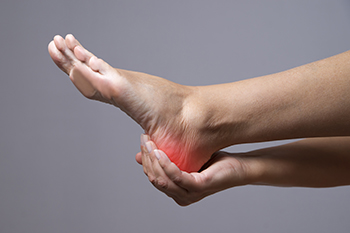
Gout in the heel, a type of inflammatory arthritis, is caused by the buildup of uric acid crystals in the joints. This condition often results from high levels of uric acid in the blood, which can be due to factors such as a diet rich in purines, excessive alcohol consumption, obesity, and certain medications. Symptoms typically include intense pain, swelling, and redness in the heel, especially during flare-ups. To manage and prevent gout, lifestyle changes are essential. Reducing intake of purine-rich foods like red meat and seafood, limiting alcohol, and maintaining a healthy weight can help lower uric acid levels. Staying hydrated and incorporating regular physical activity also contribute to better overall joint health. If you have developed this painful condition, it is strongly suggested that you are under the care of a podiatrist who can offer effective relief and treatment methods.
Many people suffer from bouts of heel pain. For more information, contact Dr. Richard DiMario of Maine. Our doctor can provide the care you need to keep you pain-free and on your feet.
Causes of Heel Pain
Heel pain is often associated with plantar fasciitis. The plantar fascia is a band of tissues that extends along the bottom of the foot. A rip or tear in this ligament can cause inflammation of the tissue.
Achilles tendonitis is another cause of heel pain. Inflammation of the Achilles tendon will cause pain from fractures and muscle tearing. Lack of flexibility is also another symptom.
Heel spurs are another cause of pain. When the tissues of the plantar fascia undergo a great deal of stress, it can lead to ligament separation from the heel bone, causing heel spurs.
Why Might Heel Pain Occur?
Treatments
Heel pain should be treated as soon as possible for immediate results. Keeping your feet in a stress-free environment will help. If you suffer from Achilles tendonitis or plantar fasciitis, applying ice will reduce the swelling. Stretching before an exercise like running will help the muscles. Using all these tips will help make heel pain a condition of the past.
If you have any questions please contact our office located in York, ME . We offer the newest diagnostic and treatment technologies for all your foot and ankle needs.